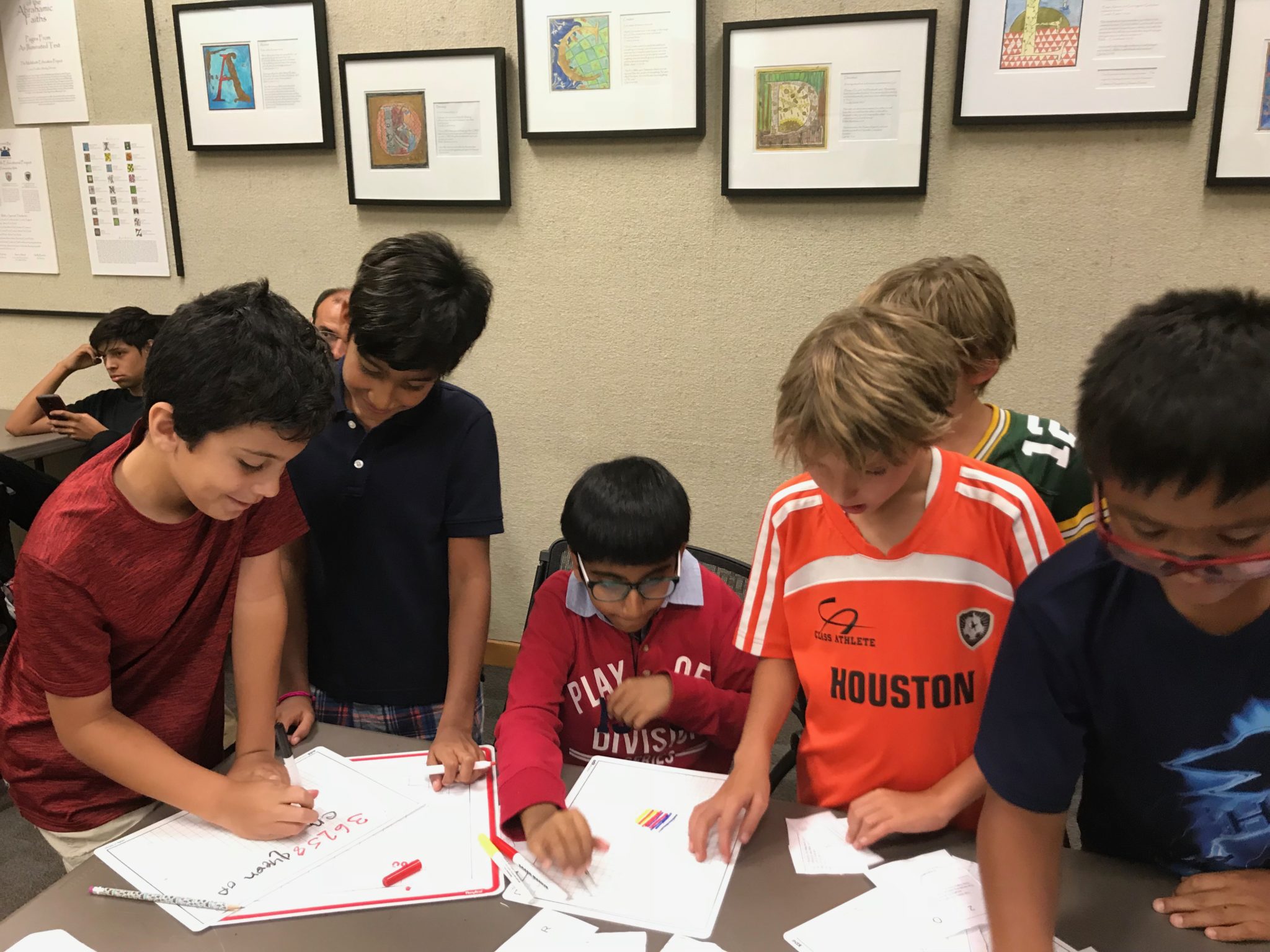Since joining together with the NBA Orlando Magic team to produce a video for the Global Math Project in May, we’ve been interested in other ways our goal of making math fun for students overlapped with other NBA initiatives. NBA Hoops is an engaging program to help kids learn math facts in a playful way through their basketball board game. NBA Hoops focuses on closing the fundamental math aptitude achievement gap for low-income eighth graders.
Orlando Math Circle does not offer remedial math support and tutoring. There are other organizations, like NBA Hoops, that offer this type of supplemental education and OMC is fulfilling a different need in the education landscape – enrichment.
Why Enrichment is Vital
Enrichment is vital for challenging assumptions and nurturing curiosity. However, as is typically the case with STEM subjects, minorities (especially black students) and girls are disproportionately underrepresented, top to bottom of the field. Maria Klawe explains here why innovations in technology and science need more diverse students pursuing math enrichment from childhood. While speaking with Dr. Mohamed Omar, Klawe learns access to math enrichment is fundamental to engaging more students of color. “[…] We should be focusing on the great achievements of the STEM workforce. These achievements come as a result of investing in the education of our youth. Increasing diversity in mathematics enrichment can be critical in leading us to a more equitable STEM workforce that also better represents a cross-section of our society. This in turn will help us tackle pressing issues from throughout the nation and beyond.”
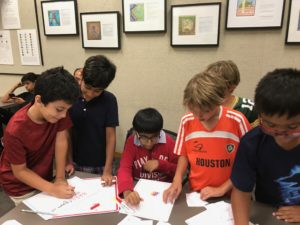
Young OMC students diving into an enrichment activity
The Case of Florida
As a means of providing math enrichment to the public, math circles explore more nuanced topics like combinatorics, number theory, and graph theory — all of which are beyond normal school curriculum. Even advanced students who take calculus in high school are usually unfamiliar with this kind of thinking. At OMC, we know that Florida students have limited exposure to this type of learning unless they have the opportunity to participate in math competitions, which many students do not. There are just four teams of 15 students in all of Florida that regularly partake in national mathematics competitions, such as the American Regions Mathematics League event. Of these 60 participants, just four students represent Orange County — three of whom attend private school and the fourth is enrolled in a competitive public magnet school. There is not a single participant from a traditional Orange County public school. With over 200,000 students enrolled in OCPS and nearly 2.7 million students in the state of Florida, this minuscule participation rate in ARML and other math competitions is demonstrative of the broader inaccessibility of math enrichment in Florida.
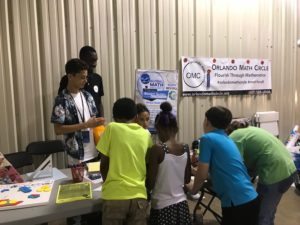
We are engaging kids in mathematics at a local level
Some readers might suggest that we are discounting well established mathematics programs in Florida, such as the Kumon network. However, OMC is distinct from Kumon as it is not about bite-sized, linear progression learning driven by school curriculum. Rather, OMC is inspired by curriculum from MSRI Math Circles Library and the National Association of Math Circles, of which OMC is a member. These include topics outside the regular school curriculum and encourages students to drive their learning with their own curiosities. The focus is on group learning through exploration of difficult problems that is guided by a facilitator. Rote tests have no place here.
Some readers might also ask why we are ignoring MathCounts. MathCounts is a national middle school math competition held at local, state, and national levels. In total there are 16 chapters in Orlando that participate in this event. Unsurprisingly, black students are underrepresented in this event, however, the Florida state winner for 2018 was African American.While MathCounts is a great program for encouraging deeper math engagement, they continue to face disproportionately low participation of girls and black students at the higher levels of competition. Anecdotally, our students report a noticeable drop-off of female participation from county to state level, dropping to around 20% and there less than 10% girls in the top 56 national winners.
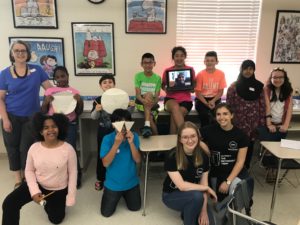
OMC offers enriching math activities to get kids interested and to keep them wanting to learn more
Bringing Math Circles to All
Accessibility is truly a struggle for math enrichment programs around the US. Math circles, like the one we have here in Orlando, are few and far between. Though quite common in Eastern Europe, math circle enrichment programs are run at a grassroots level in the USA and usually receive no commercial backing, which makes it difficult to run new activities for kids to participate in.
To give you a sense of scale, in 2017, 310 students in Florida participated in the Math Kangaroo competition. Of those 310, 60 participated through Orlando Math Circle. Estonia, with a population of about 1.3 million, making it half the size of the Orlando metropolitan area alone, had well over 20,000 students participating. By comparison, the percentage of Floridian students participating is miniscule.
The 2015 PISA (Programme for International Student Assessment) test revealed, yet again, that American students are significantly worse than their economic peers in mathematics. The USA performed below the OECD average in math and scored low in equality for male vs. female learners, as well as for stratified social backgrounds. Canada, on the other hand, was a top performer with above OECD average marks across the board.
And, unsurprisingly, Estonia is right at the top of the scale in math and science. The correlation between math enrichment and math performance is clear.
How Do We Make Accessibility a Reality?
Some of the accessibility hurdles that Orlando Math Circle works to overcome to bring math enrichment to interested students are:
- Funding – There is a cost associated with running events, renting spaces, flying in guest speakers, purchasing materials, etc. The aim of OMC is to make math enrichment available to anyone who wants to explore it, so it’s difficult to pass these costs along to the families if this is going to hinder their access.
- Transportation – Even when we can offer free programming, it is difficult to arrange transportation and having independent access to a vehicle may be a limiting factor to access for students whose family doesn’t own a car.
- Targeting Parents – It is challenging to advertise our great opportunities to parents without investing significant amounts of money into media campaigns. Dollars spent to advertise can’t be spent on activities or transportation, for example. Local channels, such as PTA boards, are highly regulated and will not share information on events unless they can ascertain the outcome of these events. Additionally, the parents that tend to reach out independent of advertising already work in the STEM field and, therefore, their children will be raised in a household that encourages enrichment beyond OMC.
- Few Competition Opportunities – The gold standard of math competitions, the American Mathematics Competitions (AMC), is difficult to participate in in the Orlando area as it is hard to find a venue offering the assessment. Aside from OMC, there are only six other schools in a 25 mile radius that proctor the AMC 8. Three of the six schools are private schools, one of the six schools, Orlando Science, is a lottery placement school, which leaves just two public schools that offer AMC 8.
- Lack of Math Community – Most people in Central Florida don’t know anything about the national math competitions, like AMC and most middle schools don’t offer it. Only a handful of local high schools have teams and practice enrichment problem solving as an extracurricular activity. There are very few students and teachers locally who get together to solve hard creative math problems. OMC found Arup Guha, who teaches computer science at UCF, to volunteer and lead problem solving sessions with our kids. He used to compete when he was in high school. Another OMC volunteer, Ruth Estabrook used to be a math coach for middle school and highs school competition mathematics. Together, we’re trying to build a math community in Orlando.
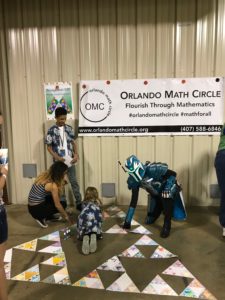
Who said math isn’t play?
Friends of Orlando Math Circle, how do we bridge the divides that preclude black students and female students from getting involved in math enrichment? How do we make math accessible to all Orlando area children that are curious to learn? We can say for certain that all of our students are underserved when it comes to math enrichment that focuses on critical reasoning in Orange County. Based on our research, we believe this is true for every county in Florida and especially for female and black students seeking programs for enrichment.
We’re committed to bringing fantastic, engaging programs to as many kids as we can, but we’d love your ideas too! Please comment below or connecting with us on Facebook.
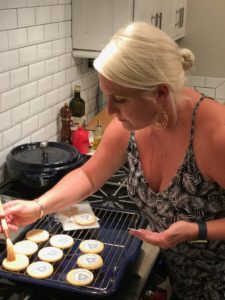
Isn’t math delicious?
